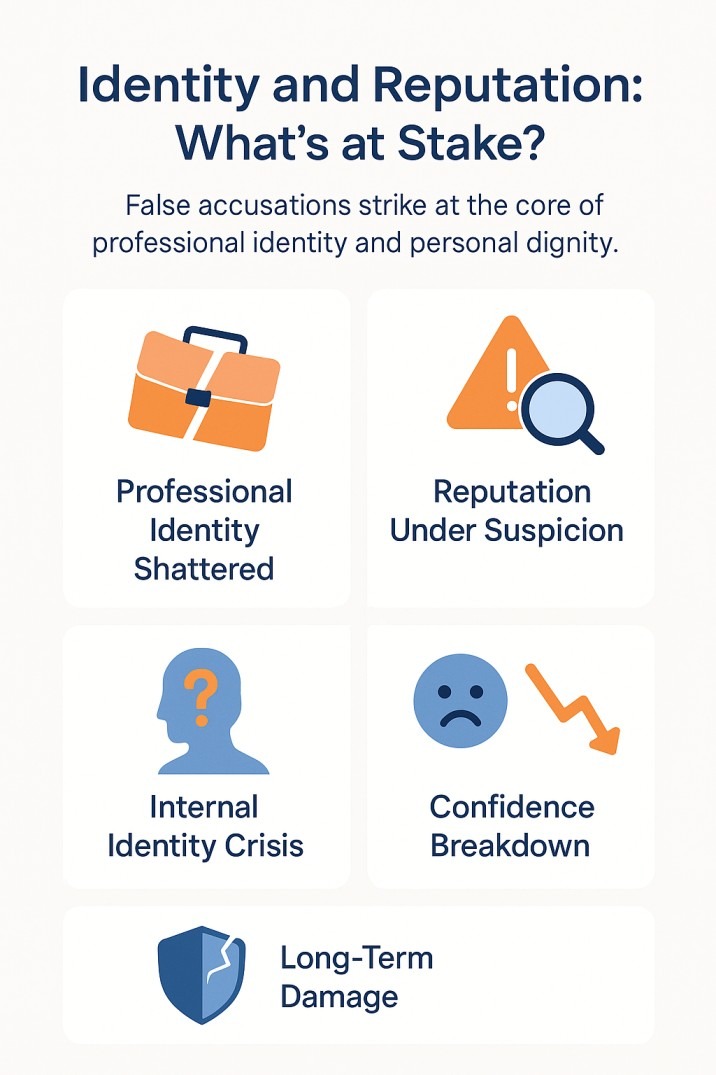False accusations can turn your workplace life upside down overnight. This guide explains the psychological effects of false accusations at work, how HR investigations affect performance and relationships, and what to do next to protect your reputation and recover.
The psychological effects of false accusations at work often include anxiety, insomnia, rumination, and social withdrawal during HR uncertainty and workplace stigma. Recovery usually starts with stabilizing routine, documenting facts calmly, and getting support you can trust.
Table of Contents
- What Should I Do If I’m Falsely Accused at Work?
- Psychological Effects of False Accusations at Work
- Immediate Psychological Effects (First Days and Weeks)
- HR Uncertainty and the Trauma of Being Disbelieved
- Long-Term Psychological Fallout
- Performance and Career Impact
- Recovery and Rebuilding Mental Wellness
What Should I Do If I’m Falsely Accused at Work?
Start here if HR is involved and you need a calm, defensible plan in the first 72 hours.
Pause emotional messages for 72 hours and keep communication short and factual.
Write one simple timeline with dates, what happened, and who was present.
Save emails, chats, and work artifacts in a single folder.
Ask HR for the allegation scope and the expected timeline, then respond fact by fact.
Get trusted support, and if your job is at immediate risk, consult an employment lawyer.
In the first 72 hours, avoid emotional emails and long explanations—keep everything calm and factual.
Create a simple timeline (dates, what happened, who was present) and save relevant messages and work artifacts in a single folder.
Ask HR for the exact scope of the allegation and the expected timeline, then respond fact by fact.
Get support you trust, and if your job is at immediate risk, consider an employment lawyer.
Psychological Effects of False Accusations at Work
The psychological effects of false accusations at work rarely stay “in your head.”
They show up in meetings, productivity, sleep, confidence, and even how colleagues treat you, while HR reviews what happened.
The table below maps the most common symptoms to how they typically manifest in the workplace, along with the first steps to help you remain stable and protect your reputation during an investigation.
This quick table maps the most common psychological reactions to how they appear at work, plus realistic first steps that reduce damage.
| Psychological effect | How it shows up at work | What helps |
|---|---|---|
| Anxiety / panic | Fear of meetings, racing thoughts, physical stress before work, constant “what if” scanning | Grounding, predictable routine, limit rumor exposure, trusted support |
| Insomnia | Night waking, early-morning dread, nightmares about the accusation | Sleep routine, caffeine cut-off, short-term professional guidance if needed |
| Rumination | Replaying conversations, drafting perfect explanations, mental looping during tasks | Write one factual timeline, then stop looping; CBT/ACT tools |
| Hypervigilance | Feeling watched, over-monitoring tone/body language, avoiding visibility or speaking up | Clear boundaries, one safe ally, facts-first HR communication |
| Social withdrawal | Skipping lunch, avoiding chats, feeling excluded or “contaminated” by the rumor | Maintain 1–2 safe connections; rebuild gradually outside the rumor zone |
| Low mood | Loss of motivation, numbness, hopelessness about career future | Professional help, movement, small goals, identity beyond work |
| Cognitive slowdown | Forgetfulness, decision fatigue, more mistakes, reduced creativity | Reduce load, prioritize essentials, checklists, calm documentation |
| Reputation fear | Over-explaining, people-pleasing, avoiding projects, assuming guilt is “in the air” | Boundaries, concise facts, mentorship/career coaching, competence proof over time |
HR investigations are psychologically intense, partly because workplace misconduct and harassment are not uncommon.
In HR Acuity’s 2023 Workplace Harassment & Employee Misconduct Insights, 52% of employees reported experiencing or witnessing workplace harassment, which helps explain why allegations—true or false—can quickly trigger fear, insomnia, isolation, and a collapse in workplace safety.
Immediate Psychological Effects (First Days and Weeks)
In the first days and weeks, the psychological effects of false accusations at work often show up as identity shock, isolation, and intense stress responses.
A Blow to Identity and Reputation

When someone is falsely accused at work, one of the first casualties is their professional identity. People spend years, sometimes decades, building reputations founded on integrity, work ethic, and professionalism. A single false accusation—regardless of its origin—can erode all of that in an instant.
The psychological effects of false accusations at work often stem from this sudden dissonance between how a person sees themselves and how they are now seen by peers and management. The accused may begin to doubt their worth, even though they’ve done nothing wrong. This disintegration of self-image creates a deep psychological wound that affects confidence, self-perception, and social behavior at work.
Isolation and the Fear of Judgement
Another major psychological impact is isolation. Colleagues may avoid the accused to steer clear of “drama” or conflict. Managers, even if they don’t believe the accusation, might choose neutrality over support. This perceived or actual withdrawal compounds the mental strain.
One of the more subtle but damaging psychological effects of false accusations at work is the feeling of being watched, evaluated, and distrusted. Victims of false allegations often develop workplace anxiety, hypervigilance, and an inability to fully engage with their teams. Social bonds that once felt solid become fragile, and trust evaporates.
Anxiety, Depression, and Sleepless Nights
It should come as no surprise that the psychological effects of false accusations at work include a significant rise in anxiety and depression. A person who once thrived in their professional role might begin experiencing symptoms of panic—rapid heartbeats, shallow breathing, or nausea—just walking into the office.
Nightmares, insomnia, and intrusive thoughts are also common. The accused may find themselves reliving conversations, questioning every interaction, and wondering what they could have done differently, even when they know they are innocent. This rumination cycle is both exhausting and self-defeating, deepening the emotional toll.
HR Uncertainty and the Trauma of Being Disbelieved
During investigations, uncertainty and silence can intensify the psychological effects of false accusations at work—even before outcomes are known.
The Trauma of Being Disbelieved
False accusations are devastating—but what truly deepens the wound is being disbelieved. One of the most harrowing psychological effects of false accusations at work stems not from the accusation itself, but from the response—or lack thereof—from peers, leaders, and HR.
The Betrayal of Silence and Inaction
When an employee faces an accusation and turns to human resources for clarity, fairness, or even emotional support, they are often met with silence, suspicion, or procedural indifference. This absence of acknowledgment can feel like a second assault—what many would describe as psychological abuse at work. Being met with cold processes instead of compassion is profoundly alienating.
Colleagues may distance themselves. Managers may avoid direct conversations. The person at the center of it all is left alone, wondering whether their reputation or even their identity has already been irreparably damaged.
When Truth Isn’t Enough
The trauma isn’t always tied to whether the person is ultimately vindicated. Rather, it’s the chilling realization that truth, evidence, and character may not be enough to shield someone from the fallout. This awareness sparks a deep existential fear: If this can happen now, what else could happen later?
This cycle of doubt and helplessness mirrors many aspects of psychological abuse at work—not being heard, not being protected, and not being treated with dignity.
Long-Term Psychological Fallout
The emotional toll can be immense. Many experience a prolonged state of hypervigilance, constantly replaying events or reanalyzing past interactions. Some withdraw entirely, disengaging from teams, projects, or even the profession they once loved.
In severe cases, this isolation and stress lead to PTSD-like symptoms—nightmares, insomnia, anxiety attacks, and depressive episodes. It’s not an overreaction; it’s the body responding to psychological abuse at work, disguised under the formalities of office protocols and risk mitigation.
The Lingering Stigma
Even if a false accusation is retracted or proven wrong, the psychological effects of false accusations at work often don’t disappear. The stain of suspicion lingers. Colleagues remember the rumor, not the exoneration. Opportunities that once came freely might now be out of reach. Promotions stall. Invitations fade. Trust takes years to rebuild—if it ever fully returns.
This lasting stigma can lead the falsely accused to change jobs, abandon careers they once loved, or develop a cynical, guarded approach to workplace interactions.
Reputational Erosion and Identity Crisis

What makes this experience uniquely brutal is its slow erosion of self. The accused may begin to question not just how others see them, but how they see themselves. Even if exonerated, they’re often haunted by the fact that people doubted their integrity.
This ongoing suspicion—even subtle or unspoken—feeds into a toxic narrative of shame and self-blame, hallmarks of psychological abuse at work. The workplace, once a source of purpose, becomes a minefield of triggers.
The Need for Trauma-Informed Workplaces
Companies must recognize that psychological abuse at work doesn’t always involve yelling or overt harassment. Sometimes it appears as procedural coldness, such as leadership that refuses to take a stand or HR systems that prioritize liability over human dignity.
Employers must build systems that treat all parties with care, ensuring investigations are fair, confidential, and trauma-informed. Failing to do so not only endangers the mental health of their employees—it fosters a culture where psychological abuse at work can thrive, unchecked and unspoken.
U.S. signal: The EEOC received 88,531 new discrimination charges in FY 2024 (more than a 9% increase from FY 2023).
UK signal: Among people who experienced workplace conflict, 42% said they felt exhausted always/often (vs 18% with no conflict), and 37% felt under pressure always/often (vs 15%).
Workplace harassment context: HR Acuity reports 52% of employees have experienced or witnessed harassment in the workplace.
Performance and Career Impact
Under sustained stress, productivity drops, decision-making slows, and even small mistakes can be misread as “proof” of guilt.
Impact on Work Performance and Career Growth
It’s a cruel paradox: while trying to survive the fallout from a false accusation, an individual is expected to continue performing at a high level. But stress and emotional trauma inevitably impact productivity.
One psychological effect of false accusations at work is a marked decline in cognitive function. Memory recall suffers. Creativity fades. Decision-making slows. And yet, these dips in performance are often interpreted as guilt or weakness, thereby reinforcing the damage. What begins as an emotional struggle quickly becomes a professional liability.
Over time, this spiral can lead to demotion, reassignment, or even forced resignation, not because the accusation was valid, but because the accused was psychologically crushed by the weight of its consequences.
The Role of Power Dynamics
Not all false accusations happen in a vacuum. Often, they are symptoms of larger power struggles, toxic hierarchies, or office politics gone awry. When someone with authority uses a false accusation as a tool—whether to eliminate a rival or cover their own failures—the damage isn’t just personal; it’s systemic.
The psychological effects of false accusations at work are amplified when the accused knows the accusation is strategic. It creates feelings of helplessness, rage, and a deep distrust in the organizational structure. In these cases, the workplace becomes a battlefield instead of a professional home.
Gaslighting and Psychological Manipulation
In some workplaces, false accusations are amplified by gaslighting: subtle tactics that make you doubt your memory, motives, or professionalism.
It can take the form of whisper campaigns, shifting standards, vague “concerns” with no specifics, or performance reviews that don’t reflect your actual work.
This environment intensifies the psychological effects of false accusations at work by driving hypervigilance, rumination, and decision fatigue. To reduce damage, anchor yourself in facts: document timelines, keep communication concise, set boundaries, and lean on support that validates reality.
Even without manipulation, the psychological effects of false accusations at work can linger—primarily through stigma, performance pressure, and prolonged uncertainty.
The Cost to Relationships Outside Work
The psychological effects of false accusations at work don’t stay neatly confined to office hours. They bleed into marriages, parenting, friendships, and even community life. The accused may become withdrawn, irritable, or emotionally unavailable.
Loved ones might try to offer support, but they often don’t fully understand the gravity of what has occurred. Without proper outlets or mental health support, the emotional strain can lead to relational breakdowns and a growing sense of alienation from the world at large.
Legal Battles and Financial Stress
If the accused chooses to fight the allegation—especially in cases involving defamation or wrongful termination—the stress multiplies. Legal battles are long, expensive, and emotionally draining. Even with a strong case, the outcome is uncertain.
The psychological effects of false accusations at work intensify during legal proceedings. Individuals may feel exposed, vulnerable, and re-traumatized by the slow, impersonal nature of litigation. Even if they win, the victory often feels hollow—because the damage has already been done.
Recovery and Rebuilding Mental Wellness
Recovery after false accusations is rarely instant. It’s a process of rebuilding identity, calming the nervous system, and restoring trust in your own judgment.
The goal isn’t to “forget” what happened, but to regain stability, protect your future at work, and move forward without carrying the accusation as your identity.
Rebuilding Confidence and Mental Wellness

Healing from false accusations isn’t just about moving past the incident—it’s about rebuilding identity, confidence, and mental wellness. It requires time, therapy, and often a change in environment. Reconnecting with one’s core values, finding new professional communities, and setting boundaries are essential steps.
The psychological effects of false accusations at work don’t vanish on their own. Recovery is an active process. The good news? With the right support systems—friends, therapists, career coaches, and honest mentors—people can rebuild their lives stronger than before.
Reclaiming Safety and Voice
Recovery from being disbelieved is slow. It requires spaces to speak, allies to listen, and, most importantly, acknowledgment from the very systems that once failed. Until then, every organizational failure to respond compassionately only reinforces the same message: Your voice doesn’t matter here.
With the proper support and clear boundaries, the psychological effects of false accusations at work can fade over time—without forcing you to abandon your career or your sense of self.
Final Thoughts
The psychological effects of false accusations at work are real—and they don’t always end when the rumor stops, or the investigation closes.
When your reputation and livelihood feel threatened, anxiety, insomnia, isolation, and long-term stress can follow even in silence. The most important thing is to remain anchored in facts, protect your mental health, and obtain appropriate support while the process unfolds.
With time, boundaries, and the right environment, recovery is possible without letting the accusation define your identity or your future.
What are the psychological effects of false accusations at work?
Common effects include anxiety, sleep disruption, rumination, loss of confidence, social withdrawal, and a constant sense of being judged or watched at work.
Can false accusations at work cause trauma or PTSD-like symptoms?
Yes, they can cause trauma-like symptoms such as hypervigilance, intrusive thoughts, panic symptoms, and avoidance, especially when the situation is prolonged or the person feels unsupported.
Why do false accusations feel so devastating even when you’re innocent?
Work is tied to identity, income, and social safety, so when your reputation is questioned the brain often reacts as if you are under threat, triggering stress, fear, and obsessive replaying of events.
What should I do if I’m falsely accused at work?
Keep communication calm and factual, create a timeline, save relevant messages and work artifacts, ask HR for the exact scope and process timeline, and get support you trust while the investigation runs.
What should I avoid in the first 72 hours after a false allegation?
Avoid emotional emails, long explanations, venting to coworkers, and posting online, do not delete anything, and respond point by point only when HR requests information.
Can false accusations affect work performance and decision making?
Yes, stress can impair focus, memory recall, and judgment, which can reduce performance and confidence, so keeping documentation and routines stable helps protect your work output.
How long do the psychological effects of false accusations at work last?
Some people recover quickly once the issue is resolved, but others experience lingering anxiety, mistrust, or stigma for months, especially if the allegation spread socially or hurt career opportunities.
What does it feel like socially when you are falsely accused at work?
Many people experience isolation, awkward silence, fewer conversations, and a feeling of being watched, which can trigger hypervigilance and make normal teamwork feel unsafe.
Can false accusations damage your reputation even if you are cleared?
They can, because people remember rumors longer than outcomes, so it helps to stay consistent, document facts, and rebuild trust through steady performance and boundaries over time.
Should I talk to an employment lawyer if I am falsely accused?
If your job, license, or reputation is at immediate risk or you suspect retaliation or defamation, legal advice can clarify your options and help you protect yourself.
How do I rebuild confidence after being falsely accused at work?
Stabilize basics like sleep and routine, lean on trusted support, aim for small work wins, and consider therapy or coaching if anxiety and rumination keep pulling you back into the event.
Andrea Balint is a writer and researcher focused on human behavior, workplace psychology, and personal growth. Through her work at CareersMomentum, she explores how mindset, leadership, and emotional intelligence shape modern careers. With a background in communication and HR development, she transforms complex ideas into practical insights that help readers build clarity, confidence, and professional purpose.
